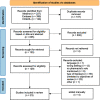Pharmacists' clinical roles and activities in inpatient hospice and palliative care: a scoping review
- PMID: 36773207
- PMCID: PMC9918816
- DOI: 10.1007/s11096-023-01535-7
Pharmacists' clinical roles and activities in inpatient hospice and palliative care: a scoping review
Abstract
Background: Pharmacists contribute to medication safety by providing their services in various settings. However, standardized definitions of the role of pharmacists in hospice and palliative care (HPC) are lacking.
Aim: The purpose of this scoping review was to provide an overview of the evidence on the role of pharmacists and to map clinical activities in inpatient HPC.
Method: We performed a scoping review according to the PRISMA-ScR extension in CINAHL, Embase, and PubMed. We used the American Society of Hospital Pharmacists (ASHP) Guidelines on the Pharmacist's Role in Palliative and Hospice Care as a framework for standardized categorization of the identified roles and clinical activities.
Results: After screening 635 records (published after January 1st, 2000), the scoping review yielded 23 publications reporting various pharmacy services in HPC. The articles addressed the five main categories in the following descending order: 'Medication order review and reconciliation', 'Medication counseling, education and training', 'Administrative Roles', 'Direct patient care', and 'Education and scholarship'. A total of 172 entries were mapped to the subcategories that were added to the main categories.
Conclusion: This scoping review identified a variety of pharmacists' roles and clinical activities. The gathered evidence will help to establish and define the role of pharmacists in inpatient hospice and palliative care.
Keywords: Hospice and palliative care; Medication reconciliation; Medication review; Medication safety; Pharmacist; Pharmacy services.
© 2023. The Author(s).
Conflict of interest statement
The authors have no conflicts of interest to declare.
References
-
- Watson M, Campbell R, Vallath N, et al. et al. Principles of drug use in palliative care (chapter 5) In: Watson M, Campbell R, Vallath N, et al.et al., editors. Oxford handbook of palliative care. 3. Oxford: Oxford University Press; 2019.
Publication types
MeSH terms
LinkOut - more resources
Full Text Sources
Medical


